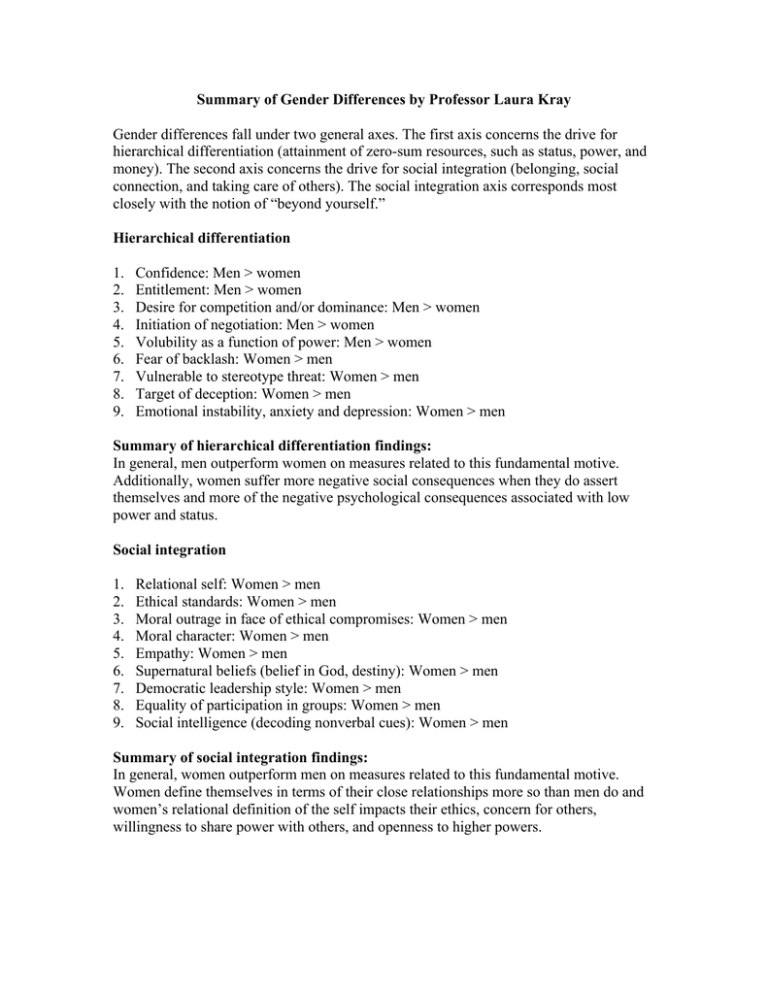Summary of Gender Differences by Professor Laura Kray Gender
advertisement

Summary of Gender Differences by Professor Laura Kray Gender differences fall under two general axes. The first axis concerns the drive for hierarchical differentiation (attainment of zero-sum resources, such as status, power, and money). The second axis concerns the drive for social integration (belonging, social connection, and taking care of others). The social integration axis corresponds most closely with the notion of “beyond yourself.” Hierarchical differentiation 1. 2. 3. 4. 5. 6. 7. 8. 9. Confidence: Men > women Entitlement: Men > women Desire for competition and/or dominance: Men > women Initiation of negotiation: Men > women Volubility as a function of power: Men > women Fear of backlash: Women > men Vulnerable to stereotype threat: Women > men Target of deception: Women > men Emotional instability, anxiety and depression: Women > men Summary of hierarchical differentiation findings: In general, men outperform women on measures related to this fundamental motive. Additionally, women suffer more negative social consequences when they do assert themselves and more of the negative psychological consequences associated with low power and status. Social integration 1. 2. 3. 4. 5. 6. 7. 8. 9. Relational self: Women > men Ethical standards: Women > men Moral outrage in face of ethical compromises: Women > men Moral character: Women > men Empathy: Women > men Supernatural beliefs (belief in God, destiny): Women > men Democratic leadership style: Women > men Equality of participation in groups: Women > men Social intelligence (decoding nonverbal cues): Women > men Summary of social integration findings: In general, women outperform men on measures related to this fundamental motive. Women define themselves in terms of their close relationships more so than men do and women’s relational definition of the self impacts their ethics, concern for others, willingness to share power with others, and openness to higher powers. References Amanatullah, E. T., & Morris, M. W. (2010). Negotiating gender roles: Gender differences in assertive negotiating are mediated by women’s fear of backlash and attenuated when negotiating on behalf of others. Journal of Personality and Social Psychology, 98(2), 256. Cohen, T. R., Panter, A. T., Turan, N., Morse, L., & Kim, Y. (2014). Moral character in the workplace. In press, Journal of Personality and Social Psychology. Cross, S. E., & Madson, L. (1997). Models of the self: Self-construals and gender. Psychological Bulletin. 122, 5-37. Eagly, A. H., & Johnson, B. T. (1990). Gender and leadership style: A metaanalysis. Psychological Bulletin. 108, 233-256. Ehrlinger, J. & Dunning, D. (2003). How chronic self-views influence (and potentially mislead) estimates of performance. Journal of Personality and Social Psychology, 84, 5-17. Hall, J. A. (1978). Gender effects in decoding nonverbal cues. Psychological bulletin, 85(4), 845-857. Kennedy, J., & Kray, L. J. (2013). Who is willing to sacrifice sacred values for money and social status? Gender differences in reactions to ethical compromises. Social Psychological and Personality Science. Kray, L. J., Kennedy, J. A., & Van Zant, A. B. (2014). When opportunity knocks, women are disproportionately deceived: Gender stereotypes about the ease of being misled influence negotiator deception. Revise & resubmit, OBHDP. Kray, L. J., & Roese, N. (2014). Written in the stars or blind chance: Gender differences in supernatural agency beliefs and attributions. Unpublished manuscript, UC Berkeley. Kray, L. J., & Thompson, L. (2004). Gender stereotypes and negotiation performance: A review of theory and research. Research in Organizational Behavior, 26(0), 103-182. Maccoby, E. E., & Jacklin, C. N. (1974). The psychology of sex differences. Palo Alto, CA: Stanford University Press. Niederle, M., & Vesterlund, L. (2007). Do women shy away from competition? Do men compete too much? Quarterly Journal of Economics, 122, 1067-1101. Nolen-Hoeksema, S. (1987). Sex differences in unipolar depression: Evidence and theory. Psychological Bulletin, 101, 259-282. Norenzayan, A., Gervais, W. M., & Trzesniewski, K. H. (2012). Mentalizing deficits constrain belief in a personal god. PLoS ONE, 7(5). Pratto, F., Stallworth, L. M., & Sidanius, J. (1997). The gender gap: Differences in political attitudes and social dominance orientation. British Journal of Social Psychology, 36(1), 49-68. Small, D. A., Gelfand, M., Babcock, L., & Gettman, H. (2007). Who goes to the bargaining table? The influence of gender and framing on the initiation of negotiation. Journal of Personality and Social Psychology, 93(4), 600.


